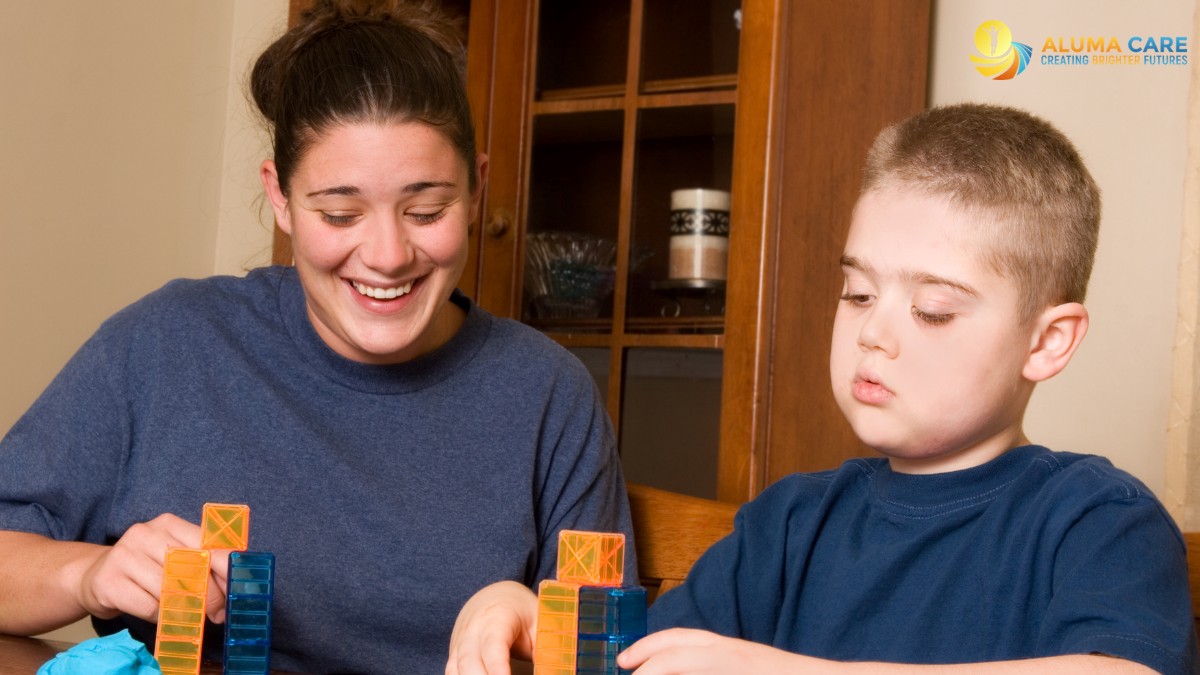Key Points:
- A great ABA therapist blends clinical expertise with patience, empathy, and adaptability.
- Key traits include clear communication, data-driven thinking, and genuine respect for each child’s individuality.
- Families in Virginia should look for providers who offer personalized, ethical, and collaborative ABA therapy—like we do at Aluma Care.
Finding the right therapist for your child can feel overwhelming, especially when you're navigating something as important as Applied Behavior Analysis (ABA) therapy. In Virginia, many families are searching not just for any therapist—but for one who truly connects with their child and understands their needs.
ABA therapy providers in Virginia, like Aluma Care, often talk about certification and credentials (and yes, those matter). But what really makes a great ABA therapist isn’t just found on paper. It’s in how they show up for your child every single session. It’s in the tone of their voice, their consistency, and their ability to adapt in the moment.
If you’re new to ABA or looking to switch providers, this guide will walk you through the qualities and skills that separate an adequate therapist from a great one.
Clinical Skill Is the Foundation—But It’s Not the Whole Story
At its core, ABA is a data-driven therapy. It’s based on decades of behavioral science. That means a great therapist must understand how to implement behavior intervention plans, collect and interpret data, and use reinforcement strategies appropriately. But without the right human qualities layered on top, those tools can fall flat.
This is why families need to think beyond resumes and credentials. A well-rounded ABA therapist is someone who knows the science but can also see your child for who they are, not just their diagnosis.
Core Qualities of a Great ABA Therapist
You don’t need a behavioral science degree to spot a strong therapist. You just need to know what to look for—and what questions to ask. These are the traits that consistently define high-quality therapists who make lasting progress with their clients:
1. Patience Without Pressure
- ABA therapy often requires repetition and persistence. Great therapists stay calm during tough behaviors and know when to push and when to pause.
- They understand that every child learns at a different pace. When a therapist can patiently ride out the hard moments, trust builds—and that’s when growth happens.
2. Empathy That’s Visible
- A therapist should be emotionally present, not robotic. They celebrate small wins with genuine joy and approach challenges with compassion—not frustration.
- Empathy in action looks like validating a child’s distress, adjusting their tone, and meeting your child where they are emotionally.
3. Effective and Clear Communication
- Great therapists know how to talk to your child, not just at them. Whether they’re speaking to a toddler or using AAC devices, their communication is clear, consistent, and respectful.
- They also know how to keep parents in the loop—offering updates, clarifying goals, and translating technical terms into plain language.

4. Adaptability in the Moment
- No two days are alike in ABA. Your child might be calm one day and totally dysregulated the next.
- Great therapists don’t freeze when a plan isn’t working. They pivot. They tweak strategies without losing sight of the overall goals.
5. Strong Observational Skills
- A huge part of ABA involves noticing patterns—what triggers behaviors, what reinforces them, and what precedes success.
- Great therapists see the little details others miss, and they use that insight to customize their approach in real time.
6. Data-Driven, but Person-Focused
- Therapists are required to track progress through structured data. But great ones use that data to guide decisions, not replace intuition.
- They recognize that behavior is communication and use data as a tool, not a box to check.
The Importance of Rapport and Relationship
ABA therapy isn’t just about correcting behavior—it’s about building connection. If your child doesn’t feel safe or understood, progress will be slow or non-existent.
Here’s how strong rapport looks in real-world sessions:
- The therapist remembers your child’s favorite characters and incorporates them into activities.
- They adjust reinforcement to match what your child actually finds rewarding, not just what’s convenient.
- They listen to your child’s body language and respect when a break is needed.
- They laugh, play, and engage genuinely—not as a strategy, but as a human being.
At Aluma Care, we believe the relationship between a therapist and a child is just as important as the goals we’re working toward. That bond is often what unlocks motivation and engagement over time.
What Parents Should Ask When Choosing an ABA Therapist in Virginia
Whether you’re meeting a therapist for the first time or evaluating an existing provider, asking the right questions can reveal a lot about their values and style. Use the list below as a guide:
- How do you build rapport with new clients?
Look for answers that focus on connection, not compliance. - Can you describe your approach to managing challenging behaviors?
A great therapist should explain how they balance safety, empathy, and teaching replacement skills. - How do you collaborate with parents and caregivers?
Therapy works best when it includes your input and feedback—not just periodic updates. - What happens if a child is having an “off” day?
Adaptability is key. Rigid scripts don’t work in real-life families. - How do you measure and celebrate progress?
Data is vital, but so is emotional growth, increased confidence, or fewer meltdowns. - What training and supervision do you receive?
Great therapists are supported by strong BCBAs and continue learning, even after certification.
These questions aren’t just about vetting skills—they’re about understanding whether a therapist will fit into your child’s world.

How Great ABA Therapists Empower Families
One often overlooked—but critical—element of ABA therapy is parent involvement. The best ABA therapists don’t operate in a vacuum. They empower caregivers to carry out strategies between sessions and adjust home routines to reinforce progress.
Here’s how great therapists help families feel confident:
- They model techniques in real time, showing you exactly how to prompt or reinforce behavior.
- They give actionable feedback in plain English, not jargon.
- They check in about what’s working (and what’s not) and respect your family’s input.
- They help you track progress in a way that doesn’t feel like another chore.
That kind of partnership is a key part of what we prioritize here at Aluma Care. Families don’t just need therapy—they need support systems that include them every step of the way.
Wrapping It Up: It’s About More Than Training
So, what really makes a great ABA therapist in Virginia? It’s not just the certifications or the years of experience. Those things matter, but they don’t tell the whole story.
A great ABA therapist is someone who blends clinical skill with kindness, data with intuition, and structure with flexibility. They meet your child with curiosity, not assumptions. They coach your family without judgment. And they show up, consistently, with a goal of helping your child build a meaningful, joyful life—on their own terms.
If you’re looking for ABA therapy in Virginia, we’d love to talk about how we can support your family.
Get in touch today to learn more about our approach, our team, and how we personalize therapy to truly fit your child’s world.












.jpg)
.jpg)
.jpg)







.png)